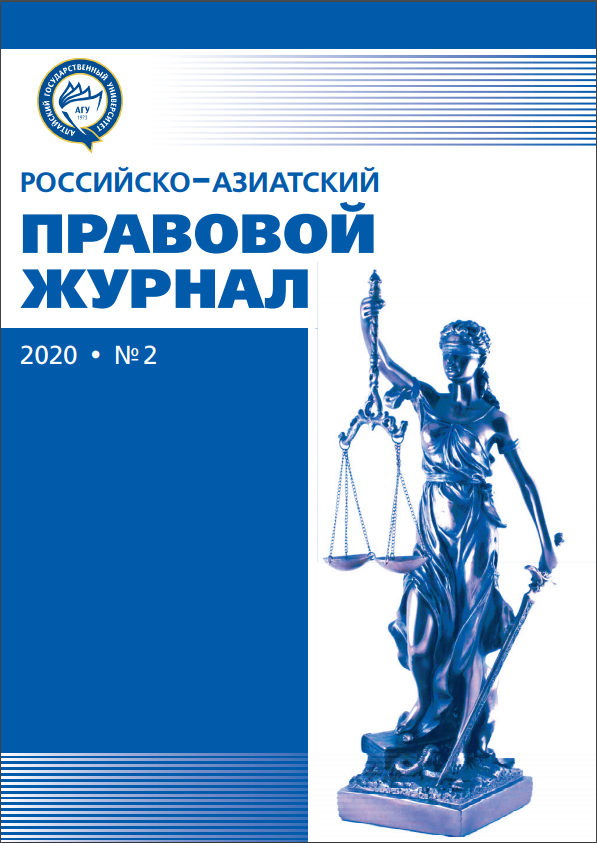PLACE OF CRYPTOCURRENCY IN THE SYSTEM OF CIVIL RIGHTS
УДК 347.211 ББК 67.404
Abstract
In the context of digitalization, the issues of determining the legal regulation of matters related to theuse of cryptocurrencies are naturally becoming increasingly relevant. The qualification of cryptocurrencyas an object of civil rights is one of the most important aspects of the legal regime of cryptocurrency. Theneed for high-quality development and registration of the legal regime of cryptocurrency, incorporationof this phenomenon into the legal system of the Russian Federation requires a detailed study of theissues of determining the place of cryptocurrency in the system of civil rights, attributing legal signs ofproperty or property rights to it, or, conversely, postulating and consolidating its fundamental identityand individuality. Analysis of the latest legal initiatives leads us to conclude that the legal regulation isinconsistent and ambiguous. Meanwhile, the courts repeatedly faced the proceedings and resolutions ofissues of cryptocurrency circulation, in particular in contractual disputes and bankruptcy disputes, whichpredetermined a certain judicial community approach to the concept of cryptocurrency and it’s qualificationsas an independent object of civil rights
Downloads
References
2. Савельев А.И. Криптовалюты в системе объектов гражданских прав // Закон. 2017. №8.
3. Мейер Д.И. Русское гражданское право : в 2 ч. М., 2003.
4. Агарков М.М. Обязательство по советскому гражданскому праву. М., 1940.
5. Иоффе О.С. Обязательственное право. М., 1975.
6. Лысенко А.Н. Имущество в гражданском праве России. М., 2010.
7. Перов В.А. Об особенностях правового регулирования правоотношений в сфере оборота криптовалют на территории Российской Федерации // Российская юстиция. 2018. №3.
8. Сидоренко Э.Л. Криптовалюта как новый юридический феномен // Общество и право. 2016. №3 (57.
9. Проект Федерального закона № 419059–7 «О цифровых финансовых активах» // КонсультантПлюс. URL: http://www.consultant.ru/cons/cgi/online.cgi?req=doc&base=PRJ &n=172447#0057638832408827945 (дата обращения: 17.02.2020).
10. Российское гражданское право : учебник : в 2 томах. Том I. Общая часть. Вещное право. Наследственное право. Интеллектуальные права. Личные неимущественные права / отв. ред. Е.А. Суханов. М., 2011.
11. Федеральный закон от 18.03.2019 №34-ФЗ «О внесении изменений в части первую, вторую и статью 1124 части третьей Гражданского кодекса Российской Федерации» // КонсультантПлюс. URL: http://www.consultant.ru/document/cons_doc_LAW_320398/ (дата обращения: 17.02.2020).
12. Daniel Haeberli, Stefan Oesterhelt & Urs Meier. Homburger. Switzerland. В книге: Blockchain & Cryptocurrency Regulation. First Edition. Zurich, Switzerland: Contributing Editor Josias Dewey, 2019. URL: https://media.homburger.ch/karmarun/image/upload/homburger/H1TL5_1tm-GLI-BLCH1_CH.pdf (дата обращения: 17.02.2020).
13. Постановление Арбитражного суда Московского округа от 15.08.2019 № Ф05–8713/2017 по делу № А40–12639/2016 [сайт] [2020] URL: https://kad.arbitr.ru/Document/Pdf/A40–12639– 2016_20190815_Reshenija_i_postanovlenija.pdf?isAddStamp=True (дата обращения: 17.02.2020).
14. Постановление Девятого Арбитражного Апелляционного Суда № 09АП-16416/2018 по делу № А40–124668/2017 [сайт] [2020]. URL: https://kad.arbitr.ru/Document/Pdf/A40–124668– 2017_20180515_Postanovlenie_apelljacionnoj_instancii.pdf?isAddStamp=True (дата обращения: 17.02.2020).
Russian-Asian Law Journal is a golden publisher, as we allow self-archiving, but most importantly we are fully transparent about your rights.
Authors may present and discuss their findings ahead of publication: at scientific conferences, on preprint servers, in public databases, and in blogs, wikis, tweets, and other informal communication channels.
Russian-Asian Law Journal allows authors to deposit manuscripts (currently under review or those for intended submission) in non-commercial, pre-print servers such as ArXiv.
Authors who publish with this journal agree to the following terms:
- Authors retain copyright and grant the journal right of first publication with the work simultaneously licensed under a Creative Commons Attribution License that allows others to share the work with an acknowledgement of the work's authorship and initial publication in this journal.
- Authors are able to enter into separate, additional contractual arrangements for the non-exclusive distribution of the journal's published version of the work (e.g., post it to an institutional repository or publish it in a book), with an acknowledgement of its initial publication in this journal.
- Authors are permitted and encouraged to post their work online (e.g., in institutional repositories or on their website) prior to and during the submission process, as it can lead to productive exchanges, as well as earlier and greater citation of published work (See The Effect of Open Access).








